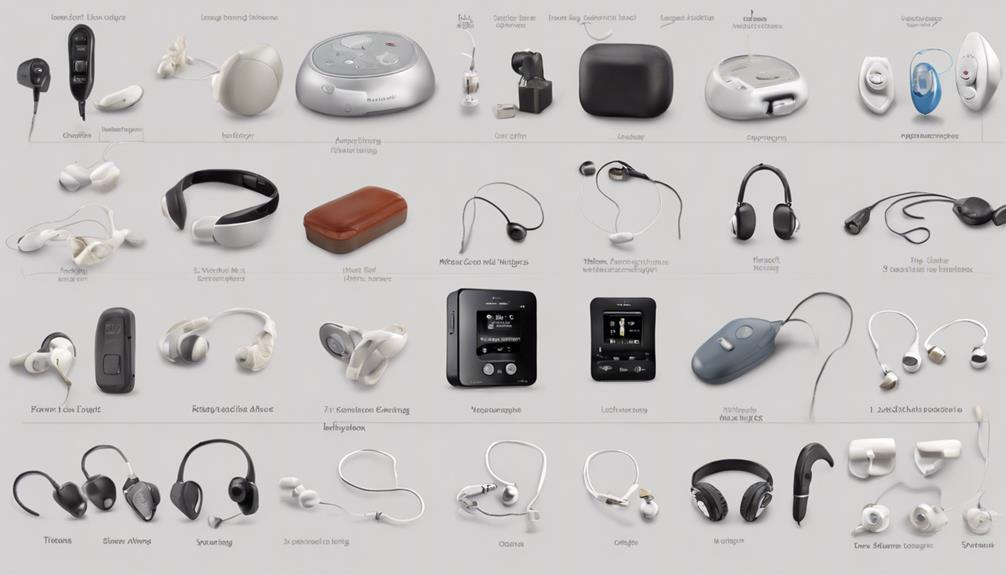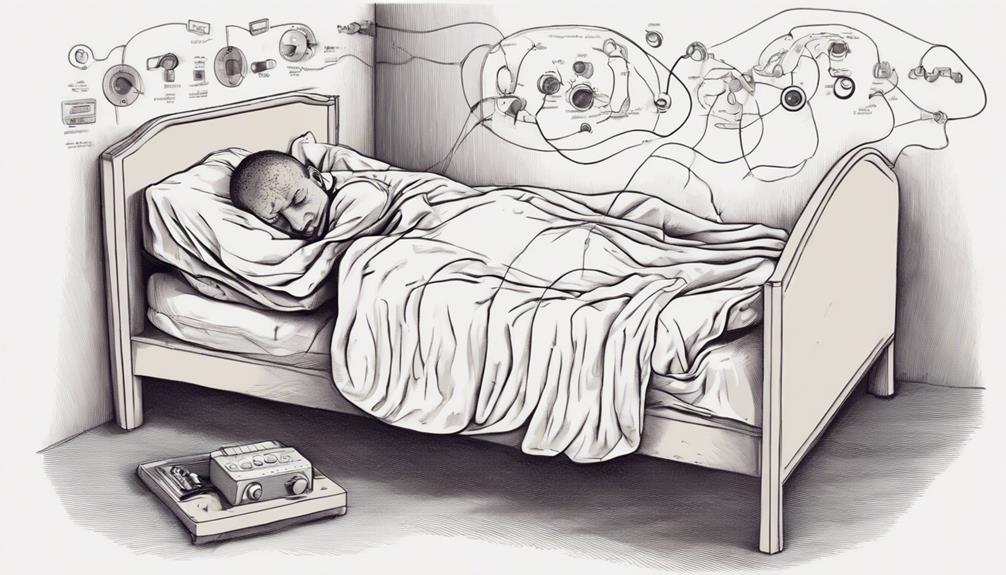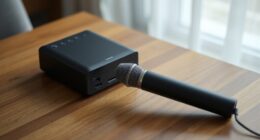Many individuals may not be aware that allergies can result in hearing loss in one ear.
The intricate connection between allergies and the auditory system can manifest in unexpected ways, impacting our ability to hear clearly.
Understanding the underlying mechanisms behind this phenomenon is crucial in comprehending the full scope of how allergies can affect our hearing.
Exploring this relationship further can shed light on the importance of early detection and management strategies in mitigating the impact of allergies on our auditory health.
Key Takeaways
- Allergies can lead to inflammation and mucus build-up, affecting hearing in one ear.
- Blocked Eustachian tubes from allergies can cause pressure imbalances and hearing loss.
- Allergy-induced mucus production may obstruct sound waves, impacting hearing in one ear.
- Prompt diagnosis and treatment of allergy-related issues are crucial to prevent hearing loss in one ear.

Joanbro Personal Sound Amplifier for Seniors, Voice Enhancement Devices, Pocket Sound Amplifiers for Elderly People, Adults, 50dB Gain, with Headphones & Earbud, 3 Types Mics, 3 Tone, Volume Control
SUPERIOR PERSONAL SOUND AMPLIFIER: Applying noise cancelling, automatic gain control and advanced amplifying circuit, this sound amplifier device...
As an affiliate, we earn on qualifying purchases.
Understanding Allergic Reaction in Ear
In the intricate workings of the ear, allergic reactions can trigger a cascade of responses leading to inflammation, swelling, and excess mucus production. Allergies affecting the ear can primarily impact the Eustachian tube, a critical passage responsible for regulating air pressure in the middle ear.
When allergies cause the Eustachian tube to become blocked, it hinders the equalization of pressure in the ear, potentially resulting in hearing loss. Excess mucus production in response to allergens can further exacerbate the situation by creating a buildup of pressure within the ear, leading to discomfort and potential hearing impairment.
This type of hearing loss, known as conductive hearing loss, occurs when sound waves are obstructed due to allergens or mucus accumulation, causing a temporary decrease in hearing ability. Therefore, understanding how allergies can influence the intricate mechanisms of the ear, particularly the Eustachian tube and excess mucus production, is crucial in comprehending the link between allergic reactions and hearing loss in one ear.
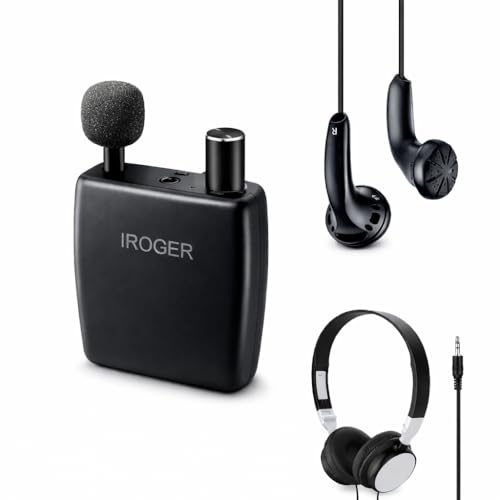
IROGER Hearing Amplifier for Seniors, Personal Sound Amplifier, Smart Auto-Gain, Directional Microphone, Rechargeable with 120-Hour Battery, Headphones & Earbuds Included
Smart Auto-Gain Control – Enjoy crystal-clear sound at all times. iRoger automatically balances audio levels to enhance voices...
As an affiliate, we earn on qualifying purchases.
Impact of Allergies on Hearing

When allergies affect the ear, they can disrupt the intricate mechanisms of hearing by causing blockages in sound transmission pathways. Allergies triggering reactions in the middle ear can lead to fluid accumulation, resulting in a decrease in sound wave conduction. This can manifest as a sensation of fullness, pressure, or even hearing loss.
The immune system responds to allergens by producing mucus, which can further exacerbate the blockage in the ear canal. The presence of mucus can create a conducive environment for middle ear infections to develop, complicating the situation and potentially causing more profound hearing issues.
The delicate structures of the inner ear, responsible for translating sound waves into electrical signals, can be affected by these allergic responses, leading to disruptions in auditory perception. It's essential to address these allergy-induced complications promptly to mitigate any lasting impact on hearing abilities.

SuperEar Model SE5000 (PSAP) for Seniors - Hearing Amplifiers for Seniors, Super Ear Personal Sound Amplifier, Sound Amplifier Listening Device and Audio Accessories in 50dB Ambient Sounds Increase
COMPATIBILITY: Response to sound amplification is completely dependent on an individual's unique ability to detect sounds. For this...
As an affiliate, we earn on qualifying purchases.
Symptoms of Allergy-Induced Hearing Loss
Experiencing allergy-induced hearing loss in one ear can manifest as muffled hearing or a sense of fullness in the affected ear. Individuals may also report itching, pressure, or discomfort in the ear, which can be attributed to inflammation caused by allergies.
The sudden onset of hearing changes in one ear, coupled with allergy symptoms, could be indicative of allergy-related hearing loss. Blockages within the outer or middle ear due to allergic reactions may result in temporary hearing impairment in that ear.
It's essential to promptly seek evaluation by a healthcare professional if hearing loss persists in one ear alongside allergy symptoms to determine the appropriate course of action. Monitoring for these symptoms and their correlation with allergy episodes can aid in early detection and management of allergy-induced hearing issues.

Audien Hearing ATOM PRO 2 Wireless Rechargeable OTC Hearing Aids, Premium Comfort Design and Nearly Invisible
Hear What Matters, Forget the Rest: Tired of asking, “What?” in conversations? The Atom Pro 2 is here...
As an affiliate, we earn on qualifying purchases.
Treatment Options for Allergy-Related Hearing Loss
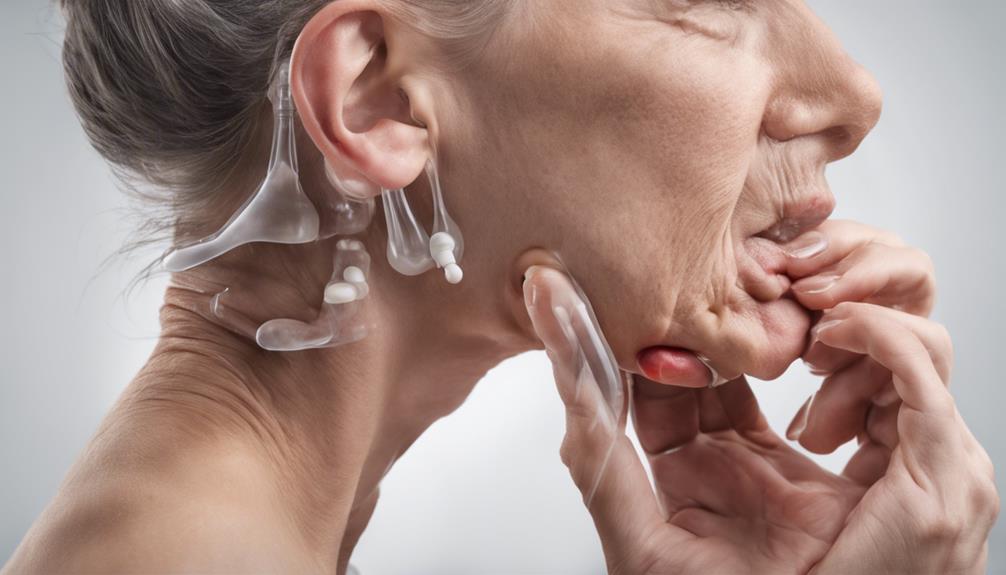
Upon identifying allergy-induced hearing loss symptoms, consulting with an ear, nose, and throat specialist is crucial for tailored treatment plans addressing individual needs. Treatment options for hearing loss caused by allergies may involve various strategies to alleviate symptoms and improve overall hearing health.
- Avoiding Allergens: Minimizing exposure to allergens can help prevent further inflammation and discomfort in the ear canal.
- Medication: Over-the-counter or prescription antihistamines can assist in reducing inflammation and enhancing hearing affected by allergies.
- Immunotherapy: In severe cases, allergy shots or oral drops may be necessary for long-term management of allergy-related hearing issues.
- Rest and Hydration: Adequate rest and proper hydration are essential for supporting the body in fighting off infections caused by allergies and aiding in the healing process of the ear.
- Consultation: Seeking guidance from a hearing care provider can ensure comprehensive care tailored to individual needs for optimal hearing outcomes.
Exploring these treatment options under the guidance of a specialist can significantly improve the impact of allergies on hearing health.
Preventing Hearing Loss Due to Allergies
To proactively prevent hearing loss caused by allergies, what specific measures can be taken? When addressing potential hearing loss due to allergies, focusing on preventive strategies becomes crucial. By taking certain precautions, individuals can reduce the risk of developing conductive hearing loss or related issues in one ear. Below is a table outlining key preventive measures:
| Preventive Measure | Description |
|---|---|
| Keep allergies under control | Effective management of allergic rhinitis can help reduce inflammation and fluid buildup in the ear. |
| Maintain good ear hygiene | Regularly cleaning the outer ear can prevent blockages and reduce the likelihood of ear infections. |
| Stay hydrated and chew gum during altitude changes | These actions can help regulate Eustachian tube function, preventing pressure imbalances in the middle ear. |
Frequently Asked Questions
Can Allergies Affect Hearing in One Ear?
Yes, allergies can indeed affect hearing in one ear. Inflammation and blockages in the ear canal from allergies can lead to temporary hearing issues. Sound transmission may be impacted due to swelling and excess mucus, resulting in conductive hearing loss.
Symptoms like pressure, fullness, and muffled hearing may indicate allergies affecting hearing. Seeking timely medical attention for allergy-related hearing loss in one ear is crucial to prevent potential long-term complications.
How Do You Fix Hearing Loss From Allergies?
When addressing hearing loss from allergies, we focus on managing the underlying allergy to alleviate inflammation and fluid buildup in the ear.
Seeking professional help is essential for accurate diagnosis and tailored treatment. By effectively managing the allergy, hearing loss in one ear caused by allergies may improve.
Consulting an ear, nose, and throat specialist is crucial for personalized treatment options for allergy-induced hearing loss in one ear.
How Long Does Allergy Hearing Loss Last?
Allergy-related hearing loss duration varies widely, with some cases resolving once allergies subside. Interestingly, one study found that around 60% of allergy-induced hearing loss in one ear improved within a few days to weeks with appropriate intervention.
Seeking professional evaluation is crucial, as individual responses to treatment differ. Monitoring symptoms and timely intervention can aid in resolving allergy-related hearing loss efficiently.
Why Am I Losing Hearing in One Ear?
We're experiencing hearing loss in one ear. It could be due to various factors such as ear infections, blockages, or even issues with the auditory nerve.
Seeking medical evaluation is crucial to determine the exact cause and appropriate treatment. Specialists can conduct tests to assess the extent of the hearing loss and recommend interventions like medications, hearing aids, or in severe cases, surgical procedures.
Early intervention often leads to better outcomes.
Conclusion
In conclusion, allergies can indeed cause hearing loss in one ear by triggering a cascade of immune responses and inflammation in the ear canals. By addressing the underlying allergies and seeking timely intervention, individuals can prevent further damage and preserve their hearing health.
Just as a skilled conductor orchestrates a symphony with precision, managing allergy-related hearing issues requires a harmonious blend of medical expertise and proactive care to ensure optimal outcomes.


